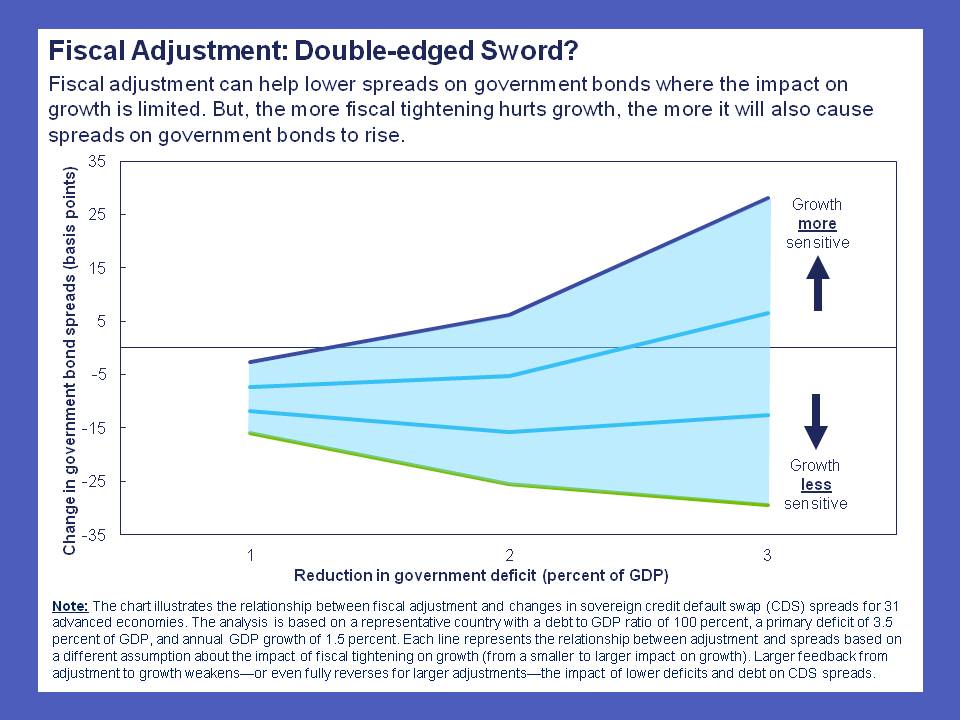(Versions in عربي, 中文, Español, Français, Русский, 日本語)
The IMF has argued for some time that the very high public debt ratios in many advanced economies should be brought down to safer levels through a gradual and steady process. Doing either too little or too much both involve risks: not enough fiscal adjustment could lead to a loss of market confidence and a fiscal crisis, potentially killing growth; but too much adjustment will hurt growth directly.
At times over the last couple of years we called on countries to step up the pace of adjustment when we thought they were moving too slowly.
Instead, in the current environment, I worry that some might be going too fast.
Risk to recovery
The latest update of the Fiscal Monitor shows that fiscal adjustment is proceeding pretty quickly in the advanced economies—on average the deficit is projected to fall by a total of 2 percentage points of GDP in 2011-12. The decline is even larger in the euro area—about 3 percentage points of GDP. In a reasonably good growth environment this pace of adjustment would be fine. But in the current weaker macroeconomic environment bringing deficits down this quickly could pose a risk for the economic recovery.
Some might argue that adjusting is like taking a bitter medicine, and that it's always best to get it over with as quickly as possible. Aggressive fiscal adjustment will surely be rewarded by markets through lower interest rates, and any cost to growth is simply the price paid to ensure that fiscal credibility is won or maintained.
Fiscal austerity & market behavior
But market behavior is much more complex than this, at least in the current crisis. For sure, markets don’t like large debt and fiscal deficits, but they also don’t like low growth. Take the recent downgrades of several European countries. Were they purely the result of fiscal problems? No. Look at the words used by Standard and Poor’s: “a reform process based on a pillar of fiscal austerity alone risks becoming self-defeating, as domestic demand falls in line with consumers’ rising concerns about job security and disposable incomes, eroding national tax revenues.”
Some of our analytical work at the IMF makes this point clearly. It shows that lower debt ratios and deficits lead to lower interest rates on government bonds, but so too does faster short-term growth. So, when countries tighten fiscal policy and the economy slows, some of the gains from better fiscal fundamentals will be lost through lower growth. We also see some evidence of a nonlinear relationship between growth and sovereign bond spreads: spreads are more likely to increase when growth is already lower and the fiscal tightening is larger (see chart). If growth falls enough as a result of a fiscal tightening, interest rates could actually rise as the deficit falls.
Country-specific fiscal policy
So how should fiscal policy respond if growth slows more than expected?
For some advanced economies, limited access to financing leaves them no option but to stick to their deficit reduction plans this year. But fiscal tightening cannot be the only tool to restore market confidence. Structural reforms to boost competitiveness and growth are also critical, but even reforms started today will take time to yield results. So it will be critical to support countries that are adjusting at an appropriate pace by making adequate financing available to them—in the euro area, through the European Financial Stability Facility and the European Stability Mechanism—to provide a boost to confidence while market perceptions adjust. Markets eventually respond to improved economic fundamentals like stronger medium-term growth and lower future deficits, but on occasion this takes a while.
There are many other advanced economies, however, where fiscal policy has more freedom. If growth slows, these countries should avoid further fiscal tightening. They should allow the impact of an economic downturn on revenues and spending on things like unemployment benefits to raise the deficit temporarily.
Among those countries with more flexibility, there are some—including in the euro area—where very low interest rates or other factors are creating adequate fiscal space to allow them to reconsider the pace of deficit reduction this year.
Take for example the United States. Based on current policies, the deficit would decline by over two percentage points of GDP in 2012, the largest single year adjustment in four decades. That’s too much. Renewing the payroll tax cut and extending unemployment compensation for the long-term unemployed—two measures set to expire this year—would provide welcome support to the economy. Actions like these would be greatly facilitated by the adoption of credible medium-term adjustment plans, which are still missing in some key economies.
The bottom line
Government debt remains very high in many advanced economies, and fiscal adjustment to bring debt down over the medium term is essential. Nearly all advanced economies plan to reduce their deficits this year. But if growth slows more than expected, some may feel inclined to preserve their short-term plans through additional tightening, even if hurts growth more. My bottom line for them: unless you have to, you shouldn’t.




